 Image search results - "nihonbashi" Image search results - "nihonbashi" |
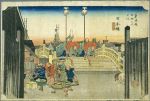
Hiroshige's woodblock print of Nihonbashi from his "Fifty-Three Stations of the Tokaido Road" series.
|
|

Eisen's woodblock print of Nihonbashi from his Kisokaido series.
|
|

Chuo-dori avenue looking toward Nihonbashi Bridge.
|
|

Nihonbashi Bridge ahead, with the expressway over it.
|
|

Omi Fair video taken on March 2, 2014 at Takashimaya Dept. Store in Nihonbashi, Tokyo. Funazushi, Omi beef, Biwa pearls, and more. We also saw Hiko-nyan.
|
|
|

Way to Takashimaya Dept. Store in Nihonbashi subway station.
|
|

The original Nihonbashi Bridge was built in 1603, out of wood.
|
|

Way to Takashimaya Dept. Store in Nihombashi subway station.
|
|

Nihonbashi Bridge and the ugly expressway above.
|
|
|

Nihonbashi Bridge today is the 19th reconstructed Nihonbashi Bridge since 1603. 日本橋
|
|

Takashimaya got its name from Takashima, Shiga Prefecture.
|
|
|

1st floor of Takashimaya Dept. Store.
|
|
|

Exhibit of Nagahama bonsai plum trees and folding screen from Hikone, 1st floor of Takashimaya Dept. Store during the Grand Omi Fair.
|
|
|
|

Bridge ornaments
|
|

Folding screen from Hikone (National Treasure).
|
|

Nihonbashi Bridge side view
|
|

PR exhibit for the Grand Omi Fair on the 8th floor.
|
|

Nihonbashi Bridge monument
|
|
|
|

The local neighborhood association wants this expressway to go underground.
|
|

1st floor of Takashimaya Dept. Store.
|
|

The double-arched bridge was built in 1911, made of granite.
|
|

Grand Omi Fair on 8th floor
|
|
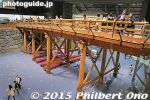
Replica of Nihonbashi Bridge at the Edo-Tokyo Museum in Ryogoku, Tokyo.
|
|
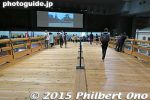
On the Nihonbashi Bridge replica at the Edo-Tokyo Museum in Ryogoku. It's not as arched as the one you see in ukiyoe prints.
|
|

About the replica of Nihonbashi Bridge at the Edo-Tokyo Museum in Ryogoku, Tokyo.
|
|

Sky roof
|
|

Tourist corner with samurai armor of Hikone's Ii Clan.
|
|

Expressway above the bridge.
|
|
|

One of the worse urban-planning decisions of the 1960s.
|
|

Funa-zushi 鮒寿し
|
|

Nihonbashi River
|
|
|

Looking toward Nihonbashi on Chuo-dori
|
|

Fish and shellfish from Lake Biwa
|
|

Bridge lamps
|
|

Ibuki Ham
|
|

Gargoyles on bridge
|
|

Ibuki Ham
|
|
|

Vegetable jam
|
|
|
|

Omi beef, each pack here cost over 2,000 yen. 近江牛
|
|
|
|
|
|

Stamp of Approval from Shiga
|
|
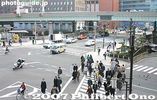
Nihonbashi as seen from Mitsukoshi Dept. Store.
|
|

Mochi making
|
|

Mochi
|
|

Memorial square for the Zero Milestone for the Five Major Roads
|
|

Adoberry sweets, from Adogawa, Takashima.
|
|
|

Adoberry sweets, from Adogawa, Takashima.
|
|

Japan's Zero Milestone for Roads 日本国道路元標
|
|
|

Japan's Zero Milestone 日本国道路元標
|
|

Entrance to crafts booths. 工芸展
|
|

Distances from the Zero Milestone to major cities such as Chiba, Mito, and Sapporo.
|
|

Omi crafts booths
|
|

Distances from the Zero Milestone to major cities such as Yokohama, Kyoto, and Kagoshima.
|
|

Kimono in the middle costs 1,995,000 yen. However the most expensive thing I saw was a Buddhist altar selling for 40 million yen (lots of gold leaf).
|
|
|

Making candles.
|
|

Nihombashi subway station 日本橋駅
|
|

Nihombashi subway station where the Tozai and Ginza Line pass through. 日本橋駅
|
|

Way to Takashimaya Dept. Store
|
|

Chuo-dori boulevard in Nihonbashi 日本橋 中央通り
|
|

Eitai-dori 永代通り
|
|

Chuo-dori boulevard in Nihonbashi 日本橋 中央通り
|
|

Takashimaya Dept. Store in Nihonbashi 高島屋 日本橋
|
|

Takashimaya Dept. Store 高島屋
|
|

Inside Takashimaya Dept. Store, Nihonbashi
|
|

Chuo-dori toward Mitsukoshi Dept. Store
|
|

Mitsukoshi Dept. Store annex
|
|

Mitsukoshi Dept. Store in Nihonbashi 三越デパート 日本橋
|
|
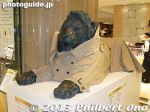
Lion statue wearing a coat inside Mitsukoshi Dept. Store in Nihonbashi in autumn.
|
|

Monument marking Tokyo's fish market during the Edo Period before it was destroyed by the 1923 earthquake and moved to Tsukiji in 1935.
|
|

Coredo complex which replaced the Tokyu Dept. Store.
|
|

Inside Coredo
|
|

Tokyu Dept. Store in Nihonbashi on Jan. 31, 1999, its last day before the store closed. This store used to be Shirokiya.
|
|
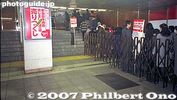
Crowd line up to enter Tokyu Dept. Store in Nihonbashi on Jan. 31, 1999.
|
|
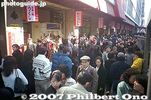
Crowd line up to enter Tokyu Dept. Store in Nihonbashi on Jan. 31, 1999.
|
|

Crowd enter Tokyu Dept. Store in Nihonbashi for the closeout sale on Jan. 31, 1999.
|
|
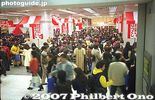
Crowd in Tokyu Dept. Store in Nihonbashi on Jan. 31, 1999.
|
|
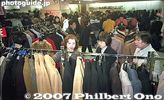
Crowd in Tokyu Dept. Store in Nihonbashi on Jan. 31, 1999. There were bargains to be had.
|
|
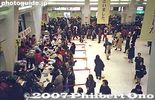
Crowd in Tokyu Dept. Store in Nihonbashi on Jan. 31, 1999.
|
|

Thank you banners in Tokyu Dept. Store in Nihonbashi on Jan. 31, 1999, last day.
|
|

Victory parade for Japan's Rio Olympic and Paralympic medalists was held on Oct. 7, 2016 in Tokyo's Ginza and Nihonbashi areas. At Nihonbashi near Mitsukoshi Dept. Store.These photos were taken at Nihonbashi.
|
|

About 800,000 crowded the sidewalks along the 2.5 km route on Chuo-dori that goes through Ginza 4-chome.
|
|

Crowd control
|
|

Crazy about the Olympics, that's Japan.
|
|

Passing out a newspaper extra about the parade.
|
|

The parade was headed by policewomen on white motorcycles. They wore the red Olympic uniform.
|
|

Policewomen on white motorcycles.
|
|
|
|

Start of the parade of 50 Olympian and 37 Paralympian medalists on four double-decker, open top buses and two flatbed trucks. The Olympians wore red uniforms while the Paralympians wore white.
|
|

Paralympians on a flatbed truck first appeared. They are wheelchair rugby players who won the bronze.
|
|

Paralympians on a flatbed truck first appeared. They are wheelchair rugby players who won the bronze.
|
|

Paralympian wheelchair rugby players Ikezaki Daisuke, Ike Yukinobu 池崎大輔 池透暢
|
|
|
|
|

Nakazato Shin, wheelchair rugby bronze medalist. 仲里進
|
|

Paralympians on a flatbed truck first appeared. They are wheelchair rugby players who won the bronze.
|
|
|
|

Wheelchair tennis medalists.
|
|

Boccia medalists 廣瀬隆喜 杉村英孝
|
|
|
|
|

Yui Kamiji, bronze medalist in women's single wheelchair tennis. 上地結衣
|
|

Saida Satoshi, wheelchair tennis bronze medalist in Rio. 齋田悟司
|
|

Olympian buses coming over Nihonbashi Bridge. As I had hoped, Nihonbashi was not as crowded as Ginza. In Ginza, there were people who waited from midnight or 5 am this morning to see this parade.
|
|

Rio Olympic medalists parade on Oct. 7, 2016 in Ginza-Nihonbashi, Tokyo.
|
|
|
|
|
|
|
|
|
|

Kaori Icho, freestyle wrestler who made Olympic history by winning the Olympic gold medal four times in a row (since Athens in 2004). No other woman has won an Olympic gold that many consecutive times for an individual event.
|
|

Kaori Icho, freestyle wrestler who made Olympic history by winning the Olympic gold medal four times in a row (since Athens in 2004).
|
|
|
|
|
|
|

Sprinters and silver medalists Yoshihide Kiryu (middle) and Shota Iizuka (right) who got their Olympic glory in the 400-meter relay race
|
|

Sprinters and silver medalists Yoshihide Kiryu (middle) and Shota Iizuka (right) who got their Olympic glory in the 400-meter relay race
|
|
|
|
|

On the right is Ayaka Takahashi, Japan's first badminton player to win an Olympic gold medal.
|
|

On the left is synchronized swimmer Yukiko Inui who won two bronze medals for duet synchronized swimming and Team synchronized swimming at Rio.
|
|
|
|

Paralympians not on wheechairs.
|
|

Paralympians
|
|
|

Paralympians Tanaka Mai (Women's tandem B cycling time trial silver medalist, pilot for Kanuma Yurie), Kanuma Yurie (Women's tandem B cycling time trial silver medalist), Masaki Fujita (Road Cycling TT bronze medalist) 田中まい 鹿沼由理�
|
|

Misato Michishita, silver medalist in women's Paralympic marathon in Rio 2016. 道下美里
|
|

Misato Michishita, silver medalist in women's Paralympic marathon in Rio 2016. 道下美里
|
|
|
|
|
|
|
|
|
|
|
|
|
|
|

Judo medalists. On the left is Hisayoshi Harasawa, judo silver medalist in 100+ kg class. In the middle is Takanori Nagase, judo bronze medalist in 81 kg. On the right is Shohei Ono, judo gold medalist in 73 kg.
|
|

Mashu (Matthew) Baker, judo gold medalist in 90 kg.
|
|

On the right is Mashu (Matthew) Baker, judo gold medalist in 90 kg. Father was American, mom Japanese. One of the high-profile mixed-blood Japanese Olympians at Rio.
|
|
|
|

On the left is Kaori Matsumoto, judo bronze medalist in women's -57 kg. She was giving her trademark "beast" pose. On the right is Haruka Tachimoto, Japan's sole female judo gold medalist (70 kg) in Rio.
|
|

On the left is Kaori Matsumoto, judo bronze medalist in women's -57 kg. She was giving her trademark "beast" pose. On the right is Haruka Tachimoto, Japan's sole female judo gold medalist (70 kg) in Rio.
|
|

On the left is Kanae Yamabe, judo bronze medalist in women's 78+ kg.
|
|
|
|

The thing about this parade is that you get to see only half of the medalists. The other half face the other side of the road. Missed Ai Fukuhara, Saori Yoshida, Kohei Uchimura, etc. Wouldn't it be great if they made a U-turn and drove back so we can see the other half?
|
|

And there they go.
|
|

The parade went by in about 10 min. It was worth the wait and the hot sun. Wait till next time. Crowd will be more massive.
|
|
|
|
|
|
|
|
|